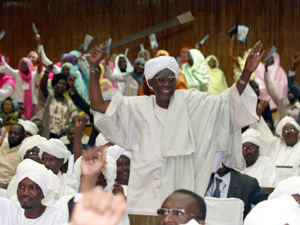What will happen in Sudan?
By Saeed Shabazz -Staff Writer- | Last updated: Aug 13, 2010 - 4:40:22 PMWhat's your opinion on this article?

Residents of Sudan’s capital Khartoum who are originally from Northern Darfur
react to a speech of Sudan’s President Omar Hassan al-Bashir Aug. 6. The
International Criminal Court on July 12 added genocide to the charges of war
crimes and crimes against humanity in Darfur to the charges pronounced against
President al-Bashir earlier in March 2009. Photo: EP Agency
|
When the Security Council president for August, Vitaly I. Churkin of Russia was asked by reporters why the situation in Sudan/Darfur would not be discussed, he said that things were improving in Darfur.
The Security Council July 30 extended the African Union/UN Mission in Darfur known as UNAMID for another year through July 31, 2011. The mandate includes protection of civilians; facilitating security for the delivery of humanitarian aid; and continuing internal political dialogue inside Darfur. The mission is staffed by 19,555 military personnel, 6,000 uniformed police personnel, and civilian personnel at an annual cost of $1.8 million.
The head of UNAMID, Ambassador Ibrahim Gambari of Nigeria during his briefing before the 15-member Security Council painted a rather bleak picture, saying there has been an increase in criminality such as kidnappings; and that in May 440 people were killed in clashes between rebel groups and the government.
Amb. Gambari was questioned during his press conference after the briefing his opinion on questions of genocide in Darfur. He immediately ended the press briefing, saying nothing about the issue.
The U.S. ambassador, Dr. Susan Rice, was asked at the press conference if she could explain, why the U.S. special envoy in Sudan, Maj. Gen. Scott Gration stated publicly on July 12, that his job had been “made more difficult” due to the International Criminal Court issuing a second warrant for the arrest of Sudanese President Omar al-Bashir charging him with three counts of genocide against the people of Darfur. The first warrant was issued for the arrest of the Sudanese leader in March 2009 for five counts of crimes against humanity.
“I'm not in a position to say precisely what others have said,” Amb. Rice noted. “Suffice to say the U.S. stands firmly behind justice and accountability for genocide, war crimes and crimes against humanity.”
A U.S. State Dept. spokesman told reporters, also on July 12, “We continue to support the ICC process. We believe that al-Bashir should present himself to the ICC to answer charges that have been leveled against him.”
The conflict in Darfur started in 2003 when rebel groups, the Justice and Equality Movement and the Sudanese Peace and Liberation Movement, began attacks against the government claiming there had been a failure to deliver greater autonomy and better governance to the Darfur region.
The UN explained the root of the conflict stemmed from “economic marginalization” and “competition” over scarce resources; including a fight over access to water.
Shortly after the conflict in Darfur gained worldwide attention, accusations appeared in the media that Pres. al-Bashir had recruited a group known as the Arab Janjaweed, a militia to wipe out the “non-Arab” tribes of Darfur.
“I think there really isn't any policy for Sudan, you have Gration and Rice going back and forth—putting on a public stage show—the administration has largely ignored what is happening in Darfur,” Gerald LeMelle, executive director of the Washington-based think tank, African Action explained to The Final Call.
“I believe Gration was put in Sudan by the administration to keep an eye on President al-Bashir, because whatever he (M. Gration) is suppose to be doing isn't at all evident,” Mr. LeMelle said.
People are suffering, and things are getting worse in Darfur, according to some advocates. The world body of nations must declare something in relation to the warrant for President al-Bashir, said Rev. Herbert Daughtry, senior pastor of the House of the Lord Church in Brooklyn, and founder of National Religious Leaders of African Ancestry Concerned about Darfur.
“I thought President Obama should have been stronger in calling for an honoring of the warrant against Pres. al-Bashir,” Rev. Daughtry said.
Bill Fletcher, a senior scholar at the Institute for Policy Studies and a past president of the Washington-based lobby TransAfrica Forum said he shares a “minority position” that genocide has taken place in Darfur, and that President al-Bashir has some culpability in it. “The problem revolves around how can the crisis be settled and what will it take; and who [plural] shall be held responsible. The situation in Darfur is not totally the responsibility of al-Bashir,” Mr. Fletcher said.
“All that having been said, the question is, what happens if he is removed—will that fundamentally change the situation in Darfur?” Mr. Fletcher asked.
Min. Akbar Muhammad, the International Representative of the Nation of Islam says President al-Bashir enjoys “overwhelming popularity” among the Sudanese people. “The war in Darfur is a western campaign, at the root of it is the desire to remove President al-Bashir,” Mr. Muhammad opined.
“We cannot take a position against the Sudanese president until those who condemn him show us some real proof,” argued Mr. Muhammad. He said he is aware critics of the regime in Khartoum see the solution for saving Sudan through the lens of regime change.
INSIDE STORIES AND REVIEWS
-
-
About Harriett ... and the Negro Hollywood Road Show
By Rabiah Muhammad, Guest Columnist » Full Story -
Skepticism greets Jay-Z, NFL talk of inspiring change
By Bryan 18X Crawford and Richard B. Muhammad The Final Call Newspaper @TheFinalCall » Full Story -
The painful problem of Black girls and suicide
By Charlene Muhammad -National Correspondent- » Full Story -
Exploitation of Innocence - Report: Perceptions, policies hurting Black girls
By Charlene Muhammad -National Correspondent- » Full Story -
Big Ballin: Big ideas fuel a father’s Big Baller Brand and brash business sense
By Bryan Crawford -Contributing Writer- » Full Story






 Click Here Stay Connected!
Click Here Stay Connected!








